【精品文档】第十五届“外研社·中国银行杯”辩论赛 辩题集锦-word
- 格式:doc
- 大小:34.00 KB
- 文档页数:4
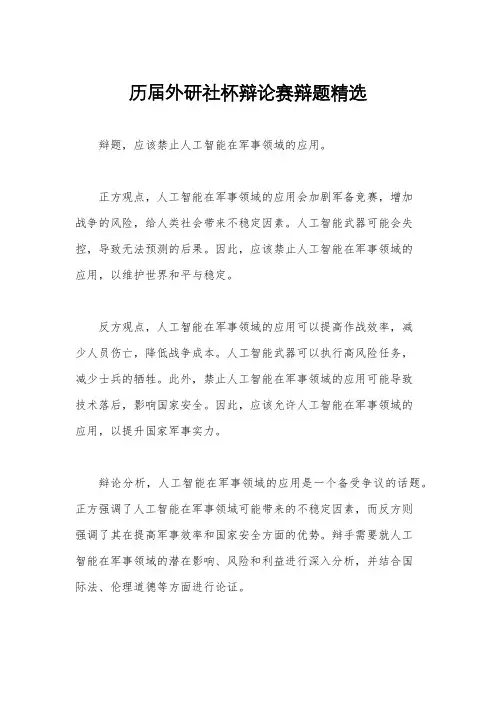
历届外研社杯辩论赛辩题精选辩题,应该禁止人工智能在军事领域的应用。
正方观点,人工智能在军事领域的应用会加剧军备竞赛,增加
战争的风险,给人类社会带来不稳定因素。
人工智能武器可能会失控,导致无法预测的后果。
因此,应该禁止人工智能在军事领域的
应用,以维护世界和平与稳定。
反方观点,人工智能在军事领域的应用可以提高作战效率,减
少人员伤亡,降低战争成本。
人工智能武器可以执行高风险任务,
减少士兵的牺牲。
此外,禁止人工智能在军事领域的应用可能导致
技术落后,影响国家安全。
因此,应该允许人工智能在军事领域的
应用,以提升国家军事实力。
辩论分析,人工智能在军事领域的应用是一个备受争议的话题。
正方强调了人工智能在军事领域可能带来的不稳定因素,而反方则
强调了其在提高军事效率和国家安全方面的优势。
辩手需要就人工
智能在军事领域的潜在影响、风险和利益进行深入分析,并结合国
际法、伦理道德等方面进行论证。
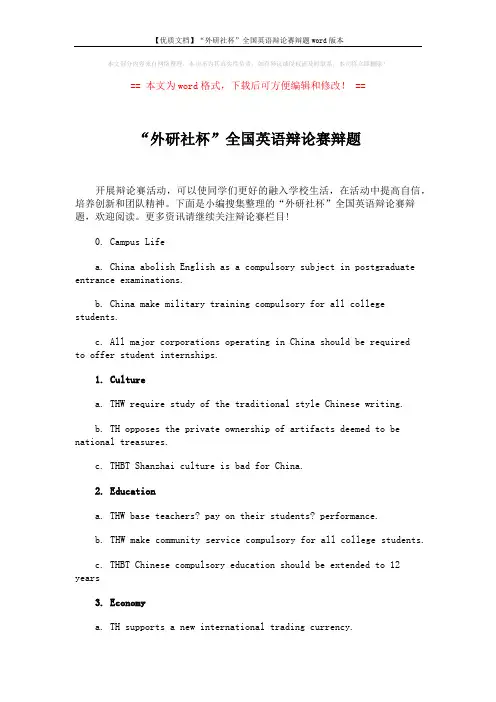
本文部分内容来自网络整理,本司不为其真实性负责,如有异议或侵权请及时联系,本司将立即删除!== 本文为word格式,下载后可方便编辑和修改! ==“外研社杯”全国英语辩论赛辩题开展辩论赛活动,可以使同学们更好的融入学校生活,在活动中提高自信,培养创新和团队精神。
下面是小编搜集整理的“外研社杯”全国英语辩论赛辩题,欢迎阅读。
更多资讯请继续关注辩论赛栏目!0. Campus Lifea. China abolish English as a compulsory subject in postgraduate entrance examinations.b. China make military training compulsory for all college students.c. All major corporations operating in China should be requiredto offer student internships.1. Culturea. THW require study of the traditional style Chinese writing.b. TH opposes the private ownership of artifacts deemed to be national treasures.c. THBT Shanzhai culture is bad for China.2. Educationa. THW base teachers? pay on their students? performance.b. THW make community service compulsory for all college students.c. THBT Chinese compulsory education should be extended to 12 years3. Economya. TH supports a new international trading currency.b. THB that China should stop buying US debt.c. China should issue consumption vouchers to stimulate the economy.4. Global climate changea. Developed nations should accept global warming refugeesb. Those affected by global climate change should have the right to sue major carbon-emitting nations.c. China should cap its carbon emissions.5. East Asiaa. Immediate elections are in Thailand抯 best interest.b. ASEAN should expel Myanmarc. Direct negotiations between the US and North Korea are preferable to the Six-Party Talks.6. Family & Populationa. THBT women should be allowed to sell their eggsb. TH would require the father抯 consent for abortions.c. China should legalize marriage between homosexuals.7. Crime & Punishmenta. Criminals sentenced to life imprisonment without parole should be allowed to choose death instead.b. China should establish a national DNA database of all citizens for the purposes of criminal investigations.c. This house would make parents liable for their children抯crimes.8. Governing & Governmenta. THW make one-year military service a qualification for public servants.。
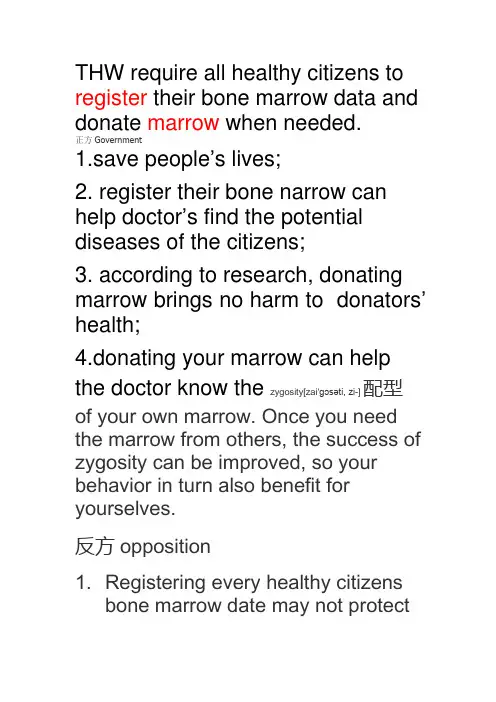
THW require all healthy citizens to register their bone marrow data and donate marrow when needed.正方Government1.save people’s lives;2. register their bone narrow can help doctor’s find the potential diseases of the citizens;3. according to research, donating marrow brings no harm to donators’health;4.donating your marrow can help the doctor know the zygosity[zai'ɡɔsəti, zi-] 配型of your own marrow. Once you need the marrow from others, the success of zygosity can be improved, so your behavior in turn also benefit for yourselves.反方opposition1. Registering every healthy citizensbone marrow date may not protectthe privacy from intendedinformation disclosure;2.Local medical condition should betake into consideration. If thecondition is bad, we can notpromise that the donator’s healthafter donation.3.We should fight against themonopoly of the marrowresources. If a singleorganization control all theresources of marrow, it can lead to corruption.THW grant t hose diagnosed with terminal illnesses t he right to access treatments that have not completed clinical testing.绝症患者应有权选择使用尚未完成临床测试检验的新药物或疗法。
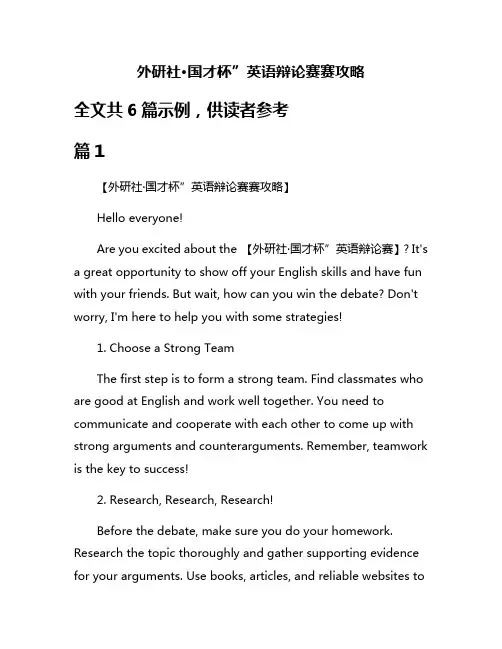
外研社·国才杯”英语辩论赛赛攻略全文共6篇示例,供读者参考篇1【外研社·国才杯”英语辩论赛赛攻略】Hello everyone!Are you excited about the 【外研社·国才杯”英语辩论赛】? It's a great opportunity to show off your English skills and have fun with your friends. But wait, how can you win the debate? Don't worry, I'm here to help you with some strategies!1. Choose a Strong TeamThe first step is to form a strong team. Find classmates who are good at English and work well together. You need to communicate and cooperate with each other to come up with strong arguments and counterarguments. Remember, teamwork is the key to success!2. Research, Research, Research!Before the debate, make sure you do your homework. Research the topic thoroughly and gather supporting evidence for your arguments. Use books, articles, and reliable websites togather information. The more you know about the topic, the stronger your arguments will be.3. Know Your AudienceDuring the debate, it's important to know your audience. Understand their perspectives and try to tailor your arguments accordingly. Think about what might convince them and address their concerns. This shows that you respect their opinions and can help you win their support.4. Structure Your ArgumentsA well-structured argument is essential in a debate. Start with a clear introduction to grab the audience's attention. Then present your main points with supporting evidence. Use examples, statistics, and personal experiences to make your arguments more convincing. Finally, summarize your key points in a strong conclusion.5. Practice, Practice, Practice!Practice makes perfect! Rehearse your arguments with your teammates before the debate. Pay attention to your body language, voice projection, and clarity of speech. Practice responding to possible counterarguments as well. The more you practice, the more confident you'll feel on the stage.6. Be RespectfulRemember, a debate is a respectful exchange of ideas. Listen carefully to the opposing team's arguments and respond in a polite manner. Avoid personal attacks or disrespectful language. Focus on the topic and present your arguments confidently and respectfully.7. Time ManagementTime management is crucial in a debate. Make sure you allocate enough time for each point and stick to the time limits. Be concise and to the point while presenting your arguments. Practice speaking within the time limits to avoid rushing or running out of time.8. Stay Calm and ConfidentLast but not least, stay calm and confident throughout the debate. Take deep breaths and remind yourself that you're prepared and knowledgeable about the topic. Speak clearly and maintain eye contact with the audience. Remember, confidence can win half the battle!ConclusionWith these strategies in mind, you're ready to rock the 【外研社·国才杯”英语辩论赛】! Work together with your team, do yourresearch, and present your arguments with confidence and respect. Remember, winning isn't everything. Enjoy the process, have fun, and learn from the experience. Good luck, and may the best team win!Yours cheerfully,[Your Name]P.S. Remember to smile and have fun!篇2How to Win the English Debate CompetitionHi there! My name is Lily and I'm a 5th grader. I just won the big English debate tournament at my school and I'm going to tell you all my tips and tricks for how to be a debate champ!First things first, you have to pick a really good topic to debate about. The best topics are things that you feel really passionate about, because then you'll have lots of energy and enthusiasm when you're debating. It could be something fun like whether dogs or cats make better pets. Or something more serious like if junk food should be banned at school.Whatever topic you choose, you have to do a ton of research and preparation! That's probably the most important thing forwinning a debate. You can't just go up there and wing it. My parents helped me find lots of books, websites, and videos about my topic so I could learn all the facts and details inside and out.While I was researching, I made sure to look at the issue from both sides - the pros and the cons. That way I could anticipate what arguments the other team might make and be ready with counter-arguments and rebuttals. I wrote down every possible point and piece of evidence, both supporting my side and the opposite view.Then I organized all my notes and evidence into a logical structure with an introduction, key arguments, and conclusion. The introduction needs to clearly state what side of the debate you are on. The body arguments need to flow smoothly from one point to the next. And the conclusion should restate your position and why your side is right in a persuasive way.Practicing your whole debate case out loud is super important too. I did mock debates with my parents where they would play the role of the opposing team. That helped me get comfortable with my arguments and rebuttals. It also helped me work on my public speaking skills like eye contact, hand gestures, vocal variety, and other techniques to keep the audience engaged.One trick I learned is to write rebuttals on little index cards or sticky notes. Then during the actual debate, I could quickly find the right rebuttal I had prepared for whatever point the other team made. It saved me from getting flustered or blanking out under pressure.Speaking of pressure, one of the hardest parts of debating is when the other team is cross-examining you by firing questions rapidly. They might try to confuse you or put you on the spot. My coach taught me to pause and take a breath before answering each cross-ex question. That little pause helped me stay calm and focused instead of getting razzed.You also need to be ready to "flow" during the debate, which means taking detailed notes about everything the opponents say. Careful flowing lets you identify gaps, contradictions or weak points in their arguments that you can exploit in your rebuttals. It's like a mental workout trying to flow, present your case, and devise strategies all at the same time!In the heat of the debate, it's easy to get flustered or lose your train of thought sometimes. If that happens, just stop, take a sip of water, and reset. Don't panic or freeze up. The judges will understand if you need to pause for a moment to collect yourself.When it's time for the closing statements, that's your final chance to drive your key points home. Reviewthe major arguments you won and the flaws in the opponents' case. Then crescendo with your most persuasive reasoning for why you decisively proved your side of the resolution. Close with passion and confidence!Whether you win or lose, the most important thing is to be a good sport and shake hands with the other team afterward. In debate, as in life, you have to be able to graciously accept setbacks and learn from them. Every debate is a chance to improve your skills for next time.Well, those are my top tips for rocking the English debate scene! The more you practice, the better and more confident you'll become. If you prepare diligently, stay poised under pressure, and debate with enthusiasm, I'm sure you'll be a champion too. The winner's circle awaits - go get 'em!篇3The "Global Talents Cup" English Debate: A Kid's Guide to WinningHey there, fellow kids! I'm sure you're all pumped up for the "Global Talents Cup" English Debate hosted by ForeignLanguage Teaching and Research Press (FLTRP). It's the ultimate battle of wits and words, where you get to show off your English skills and prove you're a true debating champ!Now, I know what you're thinking – debating sounds scary, right? All those big words and complicated arguments? Fear not, my friends! I've got some totally awesome tips that'll turn you into an unstoppable debating machine. Just follow my lead, and that shiny trophy will be yours in no time!Tip #1: Be a Sponge for KnowledgeThe first step to being a debate master is to soak up as much information as you can about the topic. Read books, watch videos, and ask your super-smart teachers lots of questions. The more you know, the better you can argue your case and shut down your opponents with facts and evidence.Tip #2: Practice Makes PerfectOnce you've crammed your brain with knowledge, it's time to start practicing your debating skills. Grab a friend or family member and have a friendly debate about anything – from whether pizza is better than burgers to which superhero is the coolest. The more you practice, the more comfortable you'll feel speaking in front of others and thinking on your feet.Tip #3: Learn to ListenDebating isn't just about talking – it's also about listening carefully to what your opponents say. Pay close attention to their arguments and look for any weaknesses or flaws. That way, you can poke holes in their case and make your own arguments even stronger.Tip #4: Use Your Body LanguageWhen you're up on that debate stage, your body language can be just as important as the words coming out of your mouth. Stand tall, make eye contact, and use confident gestures to show that you mean business. A strong presence can go a long way in convincing the judges that you're the one to beat.Tip #5: Stay Calm and ConfidentDebating can be intense, and sometimes your opponents might try to ruffle your feathers or throw you off your game. But remember, you're a cool cucumber! Take a deep breath, keep your composure, and don't let anything shake your confidence. If you believe in your arguments and present them with clarity and poise, you'll be unstoppable.Tip #6: Have Fun!At the end of the day, debating is all about having a good time and showing off your skills. Don't get too wrapped up in winning or losing – just enjoy the experience of putting your English knowledge to the test and going head-to-head with other brilliant kids. The more fun you have, the better you'll perform!So, there you have it, my friends – the ultimate kid's guide to dominating the "Global Talents Cup" English Debate. Now, go out there and show the world what you're made of! Remember, you've got this – you're a debating superstar in the making. Good luck, and may the best kid win!篇4Hey there, fellow debaters! Are you ready to conquer the New Oriental · Guocai Cup English Debate Competition? If you're feeling a bit nervous, don't worry – I've got some awesome tips to help you slay this debate like a pro!First things first, let's talk about preparation. You can't just wing it when it comes to debating – you've got to do your homework! That means researching your topic inside and out. Read up on the facts, gather evidence, and make sure youunderstand both sides of the argument. The more you know, the better you'll be able to argue your case.Next up, teamwork! Debating is a team sport, and you've got to work together with your partner (or partners, if it's a group debate). Discuss your strategies, divide up the arguments, and make sure you're not stepping on each other's toes. Communication is key, so don't be afraid to speak up if you have a brilliant idea or if you think your teammate is missing something important.Now, let's talk about the actual debate itself. When you're up there on the stage, it's important to stay calm and focused. Take a deep breath, stand up straight, and speak clearly and confidently. Remember, the judges are looking for poise and professionalism, so try to avoid fidgeting or using too many "ums" and "uhs."One of the most important things in a debate is listening. You've got to pay close attention to what your opponents are saying, so you can respond to their arguments effectively. Don't just wait for your turn to talk – actually listen to what they're saying, and be ready to counter their points with solid evidence and logic.Speaking of countering arguments, that's a crucial part of debating. When your opponents make a point, you've got to be ready to poke holes in their logic or provide evidence that contradicts their claims. But be careful – you don't want to come across as rude or disrespectful. Stay polite and professional, and focus on the facts, not personal attacks.One thing that can really make or break a debate is your delivery. Even if you have great arguments, if you're mumbling or speaking too softly, the judges (and your opponents) might not be able to understand you. Speak loudly and clearly, and use gestures and body language to emphasize your points. But don't go overboard – you don't want to come across as overly dramatic or theatrical.Finally, don't forget to have fun! Debating can be a bit nerve-wracking, but it's also an amazing opportunity to showcase your skills and learn new things. Embrace the challenge, and enjoy the thrill of intellectual competition.Okay, so those are my top tips for rocking the New Oriental · Guocai Cup English Debate Competition. Remember, preparation, teamwork, poise, listening skills, countering arguments, clear delivery, and a positive attitude are all key to success.Now, go out there and show 'em what you've got! Whether you're arguing for or against, just remember to stay confident, stay focused, and most importantly, have fun. Good luck, debaters – I'll be cheering for you!篇5Waiyanjia National Talent Cup English Debate Competition GuideHi everyone! My name is Xiaohua and I'm a 5th grade student. I recently participated in the Waiyanjia National Talent Cup English Debate Competition and I'm super excited to share my experience and tips with you!First of all, what is the Waiyanjia National Talent Cup English Debate Competition? It's a really cool debate contest for elementary and middle school students all across China. Teams of three students debate against each other in English on different topics. The best teams get to move on to the regional and then national rounds. How awesome is that?When I first heard about the competition from my English teacher, I was really nervous. Speaking English in front of so many people? That sounded terrifying! But my best friends Lily and David convinced me that we should form a team and give ita try. I'm so glad they did because it ended up being one of the most fun and rewarding experiences ever.Preparing for the DebateThe first step was choosing a topic to debate about. The competition gives you a few options and your team needs to pick one side to argue for or against. We chose to argue against the topic "Elementary school students should not have more than 1 hour of homework per night." Lily, David and I all have a ton of homework, so we knew we could speak passionately about that subject.Next up was doing research to find strong arguments and evidence to support our side. We spent weeks in the library looking through books and articles about homework policies in different countries. We made sure to find lots of expert opinions and statistics to back up our points. Gathering all that information was hard work, but it was really satisfying putting all the pieces together.Once we had our research ready, it was time to start practicing our debate speeches and rebuttals. Rebuttals are when you respond to and poke holes in the other team's arguments. We split up the different points and had each personprepare a speech section. I was in charge of the opening arguments.Practicing those speeches out loud was brutally hard at first.I fumbled over words, forgot my points, and spoke way too fast because I was nervous. But Mr. Wang, the English debate club teacher, gave us lots of useful feedback and tips. Like taking deep breaths, maintaining eye contact, speaking slowly and clearly, and being expressive with gestures and vocal variety.The more we drilled those speeches, the more confident and polished we became. We also watched video examples of good and bad debating techniques. Seeing other students' strengths and mistakes was super helpful for our own preparation.By the time the day of the first round arrived, we felt ready to face our opponents with our well-researched arguments and smooth delivery. Were we still a little scared? You bet! But we had each other's backs and a common determination to do our absolute best.The Debate DaysThe elementary school regional debate competition took place over two Saturdays. On the first day, we had twoback-to-back debates in the morning against two differentteams. I don't think my heart has ever beaten so fast! But as soon as I started giving my opening arguments, a weird calmness came over me. All the practicing paid off and the words flowed out smoothly.Lily and David did an amazing job too. Lily poked so many logical holes in the other team's reasoning during the rebuttal. And David's passionate closing arguments had me ready to join his crusade against excessive homework! In the end, we won both of those morning debates and advanced to the afternoon semifinal round.The competition was incredible to watch too. The other teams had such different debating styles and tones. Some were dramatic, aggressive, and in your face. Others were more relaxed and philosophical. A few impressive students sprinkled in humor and charming anecdotes to make their points memorable.Between rounds, our amazing teacher Mr. Wang would give us feedback and advice for adjustments. He reminded us to speak louder, gesture more confidently, and drive key arguments home with greater repetition. Those little tweaks made our semifinal debate performance even stronger than the morning.Sadly, we ended up losing a hard-fought semifinal debate to an outstanding team from Nanjing. While we were disappointed,the judges' comments praised our teamwork, smooth transitions between speakers, and strong grasp of the evidence. Just making it to the semifinals at our first debate competition felt like a huge victory.But you know what? The best part wasn't the awards or rankings. It was the journey itself and everything my teammates and I gained through the experience...What I LearnedFirst off, my English skills improved drastically from all the research, writing, and public speaking practice. I became much more comfortable comprehending, discussing, and debating complex issues in English. My vocabulary expanded, my pronunciation sharpened, and my overall confidence soared. Thanks Waiyanjia competition!Equally important were the life skills I developed through debate. Researching credible sources and analyzing evidence from multiple perspectives taught me how to think critically. Crafting persuasive arguments and defining clear points forced me to practice structured logic. And of course, respecting opponents while firmly denouncing their arguments was an exercise in constructive disagreement.Teamwork and leadership also grew tremendously. Dividing responsibilities, compromising on strategies, and supporting each other's strengths and weaknesses doesn't just happen automatically. It takes constant communication, compromise, and checking your ego at the door for the good of the team.Honestly, debate was one of themost intense extracurricular activities I've ever done. The pressure of competition with stakes on the line was an awesome adrenaline rush. But it also taught me how to manage nerves, overcome fear, and stay poised under that bright spotlight. Increasingly, I realized that when I stumbled or freezed up, it wasn't the end of the world. I could reset, recover my flow, and keep charging ahead.In the end, win or lose, what mattered most was the incredible sense of accomplishment from challenging myself far beyond what I thought possible. I surprised myself over and over with how much I was capable of when I stopped doubting and started doing. That self-confidence booster will stick with me forever.The Waiyanjia National Talent Cup English Debate Competition was one of the most enriching and empowering experiences of my life so far. While exhausting, it fed my competitive drive, expanded my skills, and pushed me to newlevels of discipline and teamwork. I can't wait to sharpen those talents further and take on the middle school division next year!To any elementary or middle school student out there considering giving debate a try, I can't recommend it enough. Sure, it's intimidating, but that's exactly why you should do it! Life begins outside your comfort zone. Debate will open up amazing opportunities for personal growth, lasting friendships, and priceless communication abilities.So what are you waiting for? Talk to your English teacher about starting a debate club at your school if you don't already have one. Then study hard, practice like crazy, and get ready to out-argue the competition! Let's go future debaters!!篇6The Ultimate Guide to Rocking the National Talent Cup English DebateHi there, fellow debaters! Are you feeling pumped and ready to show off your English skills at the big National Talent Cup debate? Or are you a little nervous about facing off against so many smart kids from across the country? Don't worry, I've got your back with all the tips and tricks you need to shine on that debate stage!First things first, let's talk about why debating in English is so awesome. Not only do you get to practice your speaking and listening abilities, but you also learn how to think critically, build persuasive arguments, and respect different viewpoints. Those are seriously cool skills that will help you out in school and life! Plus, you might just make some new friends who share your love of language and friendly competition.Now that we've covered why debate is the best, it's time to dive into my full-proof strategy for bringing home that shiny trophy. Get ready to take some notes!Preparation is KeyYou can't just wing it when it comes to debate. Putting in the hard work ahead of time is crucial for success. Here are my top prep tips:Research, research, research! Read up on the debate topics from all angles so you truly understand the different perspectives. Gather facts, stats, expert opinions - anything to bolster your arguments.Practice giving speeches out loud, either alone or with a buddy. Time yourself and get comfortable expressing your thoughts clearly and confidently.Anticipate counterarguments. What might the other team say to poke holes in your reasoning? Have solid rebuttals ready to go.If you'll be working with a partner, coordinate your arguments and practice your teamwork. You'll need to back each other up seamlessly.Get enough sleep and eat a good breakfast on debate day! You'll need all your brainpower firing on all cylinders.During the DebateOkay, the big moment has arrived and it's showtime! As you step up to the podium, keep these pointers in mind:Speak slowly and clearly. It's okay to pause for a few seconds to gather your thoughts between points. Taking your time is better than jumbling your words.Make eye contact with the judges and opposing team. This shows confidence and keeps your audience engaged.Use confident body language. Stand up straight, avoid fidgeting, and don't forget to breathe!Listen actively when it's not your turn to speak. Take notes on the other team's arguments so you can offer strong rebuttals.If you get flustered or stuck, have a sip of water and regroup.A short silence is better than rambling nonsense.Most importantly, speak from the heart. Your passion and authentic voice will make a bigger impact than just spitting out rehearsed lines.Staying Cool Under PressureLet's be real - debates can get heated sometimes! The other team might say something that riles you up or pokes holes in your well-prepared arguments. When that happens, you'll need to keep your cool. Here's how:Take a deep breath before responding. Never lash out or say something you'll regret in the heat of the moment. Stay calm and collect your thoughts.Have a few go-to phrases ready to politely disagree, like "I respectfully disagree because..." or "Another way to look at this is..."Avoid putting down the other team's arguments or getting personal. Stick to the facts and keep things focused on the debate topics.If you get flustered, it's okay to say something like "Let me think about that for a moment." Pause, collect yourself, then continue.Remember, getting frazzled or angry during a debate is completely normal! The judges know dealing with pressure is part of the challenge. As long as you handle it maturely, a few hiccups won't tank your score.Win or Lose, Have Fun!At the end of the day, the National Talent Cup debate is all about challenging yourself, learning new skills, and maybe making lifelong friends who love language as much as you do. So whether or not you take home that trophy, make sure you're soaking up every awesome moment!If you do end up winning, wahoo! Give yourself a big pat on the back and celebrate your hard work. Just don't gloat too much in front of the other teams, okay? Good sportsmanship is crucial.And if things don't go your way this time, no biggie! Look at it as motivation to study up, practice more, and come back even stronger next year. Every debate is a chance to grow.Most importantly, always remember why you decided to join the debate club in the first place - because you sincerely love using English to express your brilliant ideas and unique perspective. Never lose sight of that!Well, there you have it - all my tips and tricks for totally rocking the National Talent Cup debate. I know you've got this! Just breathe, believe in yourself, and get ready to wow those judges.I'll be cheering you on every step of the way. Now go get 'em, debate superstars!。
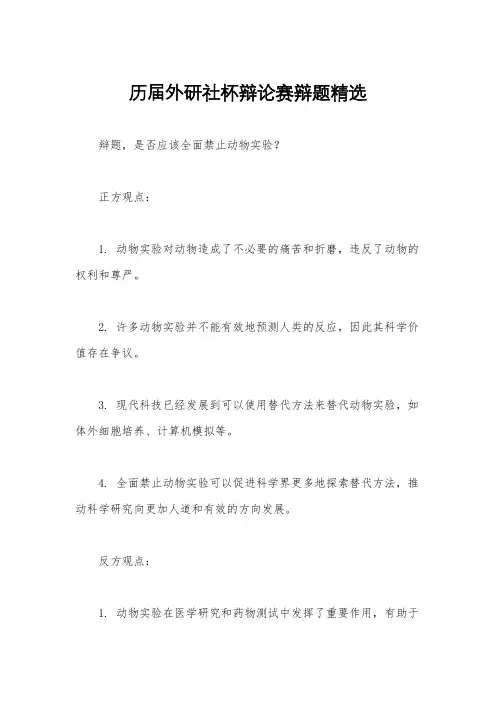
历届外研社杯辩论赛辩题精选辩题,是否应该全面禁止动物实验?
正方观点:
1. 动物实验对动物造成了不必要的痛苦和折磨,违反了动物的权利和尊严。
2. 许多动物实验并不能有效地预测人类的反应,因此其科学价值存在争议。
3. 现代科技已经发展到可以使用替代方法来替代动物实验,如体外细胞培养、计算机模拟等。
4. 全面禁止动物实验可以促进科学界更多地探索替代方法,推动科学研究向更加人道和有效的方向发展。
反方观点:
1. 动物实验在医学研究和药物测试中发挥了重要作用,有助于
保护人类健康和安全。
2. 虽然动物实验可能会对动物造成痛苦,但在保证研究的伦理和合法性的前提下,这种痛苦是可以接受的。
3. 替代方法虽然在发展,但目前仍然无法完全替代动物实验,禁止动物实验可能会影响医学研究的进展。
4. 对动物实验进行严格的监管和伦理审查,可以最大程度地减少动物的痛苦,同时保证科学研究的进行。
结论:
动物实验是一个复杂而敏感的话题,需要综合考虑动物权益、科学研究的进展以及人类健康和安全等多方面因素。
在未来的发展中,应该加强对动物实验的监管和伦理审查,同时推动替代方法的发展,最终实现对动物的尊重和科学研究的平衡发展。
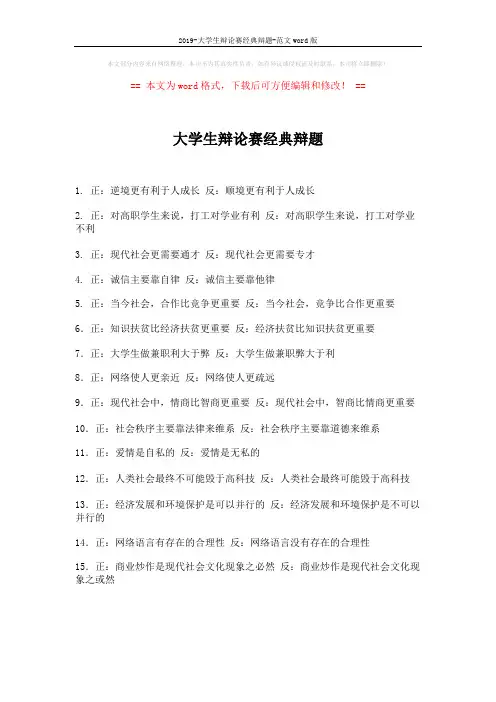
2019-大学生辩论赛经典辩题-范文word版
本文部分内容来自网络整理,本司不为其真实性负责,如有异议或侵权请及时联系,本司将立即删除!
== 本文为word格式,下载后可方便编辑和修改! ==
大学生辩论赛经典辩题
1. 正:逆境更有利于人成长反:顺境更有利于人成长
2. 正:对高职学生来说,打工对学业有利反:对高职学生来说,打工对学业不利
3. 正:现代社会更需要通才反:现代社会更需要专才
4. 正:诚信主要靠自律反:诚信主要靠他律
5. 正:当今社会,合作比竞争更重要反:当今社会,竞争比合作更重要6.正:知识扶贫比经济扶贫更重要反:经济扶贫比知识扶贫更重要
7.正:大学生做兼职利大于弊反:大学生做兼职弊大于利
8.正:网络使人更亲近反:网络使人更疏远
9.正:现代社会中,情商比智商更重要反:现代社会中,智商比情商更重要
10.正:社会秩序主要靠法律来维系反:社会秩序主要靠道德来维系11.正:爱情是自私的反:爱情是无私的
12.正:人类社会最终不可能毁于高科技反:人类社会最终可能毁于高科技
13.正:经济发展和环境保护是可以并行的反:经济发展和环境保护是不可以并行的
14.正:网络语言有存在的合理性反:网络语言没有存在的合理性
15.正:商业炒作是现代社会文化现象之必然反:商业炒作是现代社会文化现象之或然。
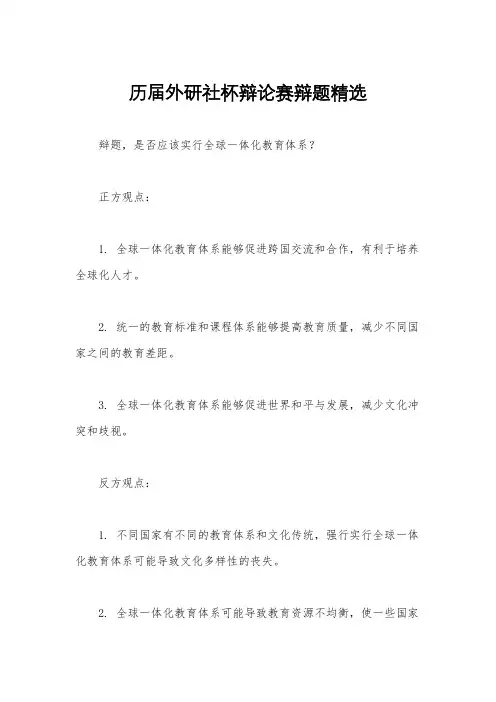
历届外研社杯辩论赛辩题精选辩题,是否应该实行全球一体化教育体系?
正方观点:
1. 全球一体化教育体系能够促进跨国交流和合作,有利于培养全球化人才。
2. 统一的教育标准和课程体系能够提高教育质量,减少不同国家之间的教育差距。
3. 全球一体化教育体系能够促进世界和平与发展,减少文化冲突和歧视。
反方观点:
1. 不同国家有不同的教育体系和文化传统,强行实行全球一体化教育体系可能导致文化多样性的丧失。
2. 全球一体化教育体系可能导致教育资源不均衡,使一些国家
的教育资源受到剥夺。
3. 教育应当符合不同国家的国情和发展需求,强行实行全球一体化教育体系可能导致教育内容的单一化和僵化化。
结论:
在全球化的今天,教育体系的一体化是趋势所在。
然而,在推进全球一体化教育体系的过程中,需要充分考虑各国的文化传统和国情,避免一刀切的做法。
同时,也需要加强国际合作,共同制定适合全球发展需求的教育标准和课程体系,促进全球教育的共同发展。
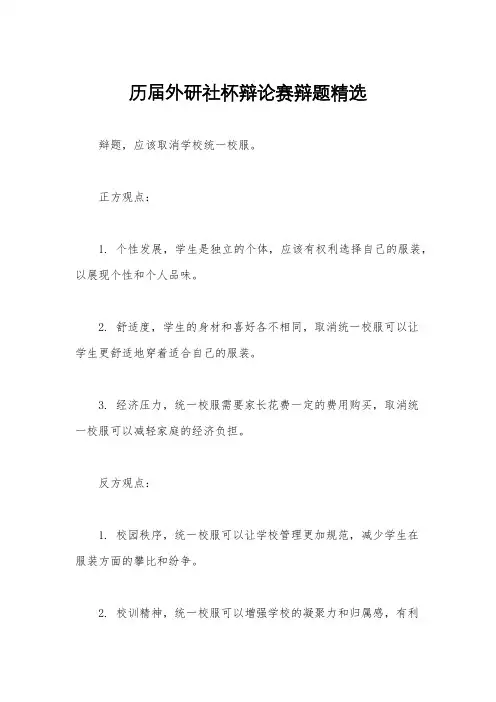
历届外研社杯辩论赛辩题精选辩题,应该取消学校统一校服。
正方观点:
1. 个性发展,学生是独立的个体,应该有权利选择自己的服装,以展现个性和个人品味。
2. 舒适度,学生的身材和喜好各不相同,取消统一校服可以让
学生更舒适地穿着适合自己的服装。
3. 经济压力,统一校服需要家长花费一定的费用购买,取消统
一校服可以减轻家庭的经济负担。
反方观点:
1. 校园秩序,统一校服可以让学校管理更加规范,减少学生在
服装方面的攀比和纷争。
2. 校训精神,统一校服可以增强学校的凝聚力和归属感,有利
于传承和弘扬学校的校训精神。
3. 社会影响,统一校服可以让学生在校外更容易被辨识和管理,有利于学校和家长对学生的监管和保护。
结论:
经过辩论,我们认为应该取消学校统一校服。
因为取消统一校
服可以更好地尊重学生的个性发展和舒适度,同时减轻家庭的经济
压力。
同时,取消统一校服也可以培养学生的自我管理能力和独立
思考能力。
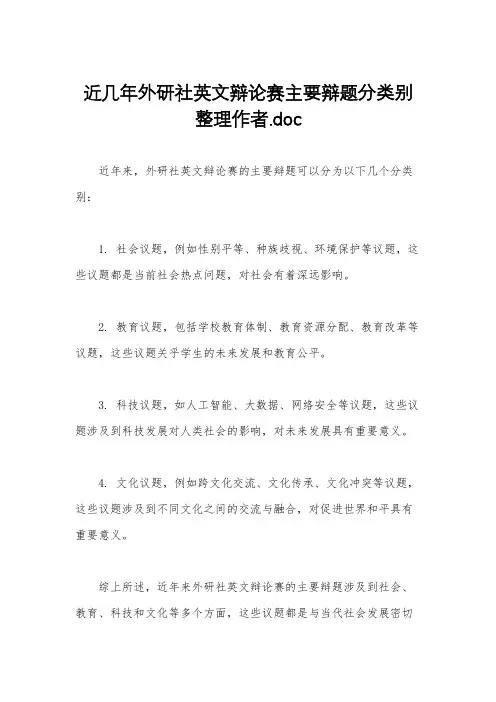
近几年外研社英文辩论赛主要辩题分类别
整理作者.doc
近年来,外研社英文辩论赛的主要辩题可以分为以下几个分类别:
1. 社会议题,例如性别平等、种族歧视、环境保护等议题,这些议题都是当前社会热点问题,对社会有着深远影响。
2. 教育议题,包括学校教育体制、教育资源分配、教育改革等议题,这些议题关乎学生的未来发展和教育公平。
3. 科技议题,如人工智能、大数据、网络安全等议题,这些议题涉及到科技发展对人类社会的影响,对未来发展具有重要意义。
4. 文化议题,例如跨文化交流、文化传承、文化冲突等议题,这些议题涉及到不同文化之间的交流与融合,对促进世界和平具有重要意义。
综上所述,近年来外研社英文辩论赛的主要辩题涉及到社会、教育、科技和文化等多个方面,这些议题都是与当代社会发展密切
相关的,参与者需要对这些议题有深入的了解和思考,才能在辩论中提出有力的论据和观点。
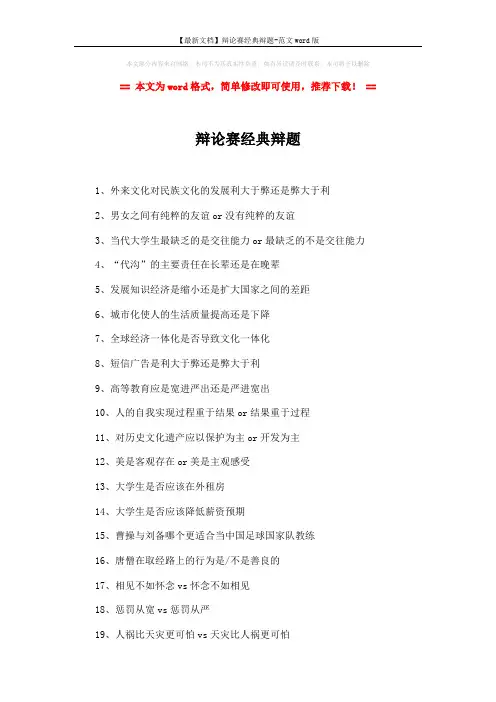
本文部分内容来自网络,本司不为其真实性负责,如有异议请及时联系,本司将予以删除== 本文为word格式,简单修改即可使用,推荐下载! ==辩论赛经典辩题1、外来文化对民族文化的发展利大于弊还是弊大于利2、男女之间有纯粹的友谊or没有纯粹的友谊3、当代大学生最缺乏的是交往能力or最缺乏的不是交往能力4、“代沟”的主要责任在长辈还是在晚辈5、发展知识经济是缩小还是扩大国家之间的差距6、城市化使人的生活质量提高还是下降7、全球经济一体化是否导致文化一体化8、短信广告是利大于弊还是弊大于利9、高等教育应是宽进严出还是严进宽出10、人的自我实现过程重于结果or结果重于过程11、对历史文化遗产应以保护为主or开发为主12、美是客观存在or美是主观感受13、大学生是否应该在外租房14、大学生是否应该降低薪资预期15、曹操与刘备哪个更适合当中国足球国家队教练16、唐僧在取经路上的行为是/不是善良的17、相见不如怀念vs怀念不如相见18、惩罚从宽vs惩罚从严19、人祸比天灾更可怕vs天灾比人祸更可怕20、网络使人亲近or使人疏远21、去向哪里比与谁同行更重要vs与谁同行比去向哪里更重要22、人的成功是基础重要vs人的成功是机遇重要23、是否应该完全禁止未成年人进入网吧24、宁为鸡头vs宁为凤尾25、现代社会是/不是拼爹时代26、国学在现代社会(不)应该大力宣扬27、知识扶贫比经济扶贫更重要vs经济扶贫比知识扶贫更重要28、落实控烟政策约束更重要还是情感教育更重要?29、恨比爱容易vs爱比恨容易30、是否应以娱乐形式高唱红歌31、初恋是/不是件小事32、学校应不应该公开展示学生的不文明行为33、中国不应该取消死刑34、高校排名是利大还是弊大35、旅游文化的真实性对旅游者不重要/重要36、整容能/不能让人找回自信37、唐僧是不是个好领导38、拿起比放下更难vs放下比拿起更难39、大学生迷茫情绪来源于环境/自身40、个性需要刻意追求vs个性不需要刻意追求41、功可以补过vs功不可以补过42、流行文化更促进/阻碍人文精神的推广43、霸权主义比恐怖主义对人类社会的威胁更大vs恐怖主义比霸权主义对人类社会的威胁更大44、富贵不能淫更难vs贫穷不能移更难45、灾难更激发人的利己性vs灾难更激发人的利他性46、经济诱因比公民意识更能促进环保的落实vs公民意识比经济诱因更能促进环保的落实47、鬼神信仰使社会安定vs鬼神信仰使社会紊乱48、类似川剧变脸这样的民族技艺应当保密类似川剧变脸这样的民族技艺不应当保密49、时势造就英雄vs英雄造就时势50、嫁给文科男/理科男更幸福以下文字仅用于测试排版效果, 请使用时删除!“山不在高,有仙则灵。
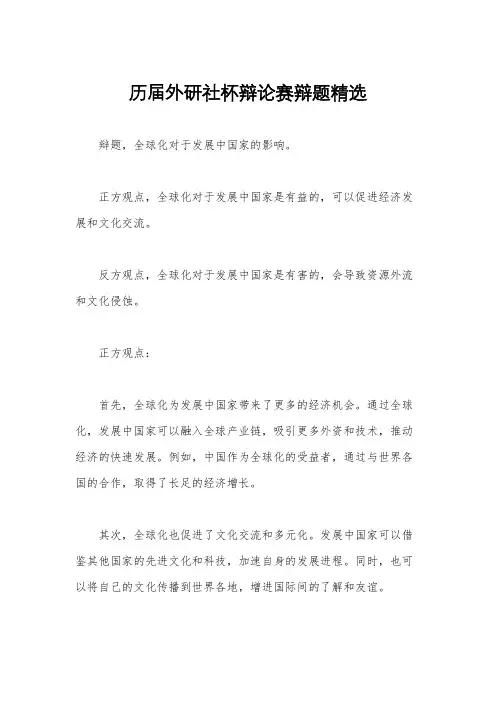
历届外研社杯辩论赛辩题精选辩题,全球化对于发展中国家的影响。
正方观点,全球化对于发展中国家是有益的,可以促进经济发展和文化交流。
反方观点,全球化对于发展中国家是有害的,会导致资源外流和文化侵蚀。
正方观点:
首先,全球化为发展中国家带来了更多的经济机会。
通过全球化,发展中国家可以融入全球产业链,吸引更多外资和技术,推动经济的快速发展。
例如,中国作为全球化的受益者,通过与世界各国的合作,取得了长足的经济增长。
其次,全球化也促进了文化交流和多元化。
发展中国家可以借鉴其他国家的先进文化和科技,加速自身的发展进程。
同时,也可以将自己的文化传播到世界各地,增进国际间的了解和友谊。
反方观点:
首先,全球化导致了资源外流和环境破坏。
发展中国家往往成
为跨国公司的资源开发和污染转移的对象,造成了资源枯竭和环境
恶化。
这对于发展中国家的可持续发展造成了严重的影响。
其次,全球化也带来了文化侵蚀和价值观冲突。
发展中国家的
传统文化和价值观面临着被西方文化冲击的风险,导致社会的不稳
定和文化的混乱。
综上所述,全球化对于发展中国家的影响是一个复杂的问题,
既有利也有弊。
我们需要在全球化的进程中,寻求平衡和解决方案,最大限度地发挥其积极作用,同时尽量减少其负面影响。
【最新】辩论赛经典辩题-实用word文档
本文部分内容来自网络,本司不为其真实性负责,如有异议或侵权请及时联系,本司将予以删除!
== 本文为word格式,下载后可随意编辑修改! ==
辩论赛经典辩题
1、外来文化对民族文化的发展利大于弊还是弊大于利
2、男女之间有纯粹的友谊or没有纯粹的友谊
3、当代大学生最缺乏的是交往能力or最缺乏的不是交往能力
4、“代沟”的主要责任在长辈还是在晚辈
5、发展知识经济是缩小还是扩大国家之间的差距
6、城市化使人的生活质量提高还是下降
7、全球经济一体化是否导致文化一体化
8、短信广告是利大于弊还是弊大于利
9、高等教育应是宽进严出还是严进宽出
10、人的自我实现过程重于结果or结果重于过程
11、对历史文化遗产应以保护为主or开发为主
12、美是客观存在or美是主观感受
13、大学生是否应该在外租房
14、大学生是否应该降低薪资预期
15、曹操与刘备哪个更适合当中国足球国家队教练。
历届外研社杯辩论赛辩题精选辩题,是否应该实行全球性的碳排放税?
正方观点:
1. 碳排放是全球变暖的主要原因之一,实行全球性碳排放税能够有效减少碳排放,减缓气候变化的影响。
2. 全球性碳排放税可以促使企业和个人更加节约能源,推动清洁能源的发展,有利于环境保护和可持续发展。
3. 实行全球性碳排放税可以减少碳排放不均衡的现象,让所有国家都承担起减排责任,有利于全球环境治理。
反方观点:
1. 实行全球性碳排放税可能会加剧发展中国家的负担,影响其经济发展和民生福祉。
2. 全球性碳排放税可能会导致跨国公司的转移定位,让一些国
家成为碳排放的“倾倒场”,不利于全球环境治理。
3. 实行全球性碳排放税需要建立全球性的监管机制和税收分配机制,难以实现统一标准和公平分配。
结论:
实行全球性碳排放税是一个复杂的问题,需要综合考虑各方利益和影响。
在推动全球环境治理的过程中,应该注重平衡发达国家和发展中国家的利益,建立公平的税收分配机制,同时加强国际合作,共同应对气候变化的挑战。
历届外研社杯辩论赛辩题精选辩题,应该禁止学生使用手机上课。
正方观点:尊敬的评委老师,各位同学,我代表正方,我们认为应该禁止学生使用手机上课。
首先,手机会分散学生的注意力,影响他们的学习效果。
许多学生在课堂上玩手机、刷微博,完全不关心老师在讲什么,这对于他们的学习是非常不利的。
其次,手机上课容易导致学生沉迷网络,影响他们的身心健康。
许多学生沉迷于手机游戏、社交媒体,忽略了课堂上老师的讲解,这对他们的成长是非常不利的。
最后,禁止学生使用手机上课可以强化学生的纪律意识,培养他们的专注力和自律能力。
因此,我们认为应该禁止学生使用手机上课。
反方观点:尊敬的评委老师,各位同学,我代表反方,我们认为不应该禁止学生使用手机上课。
首先,手机是一种现代化的学习工具,能够帮助学生获取更多的信息和知识。
许多老师也会利用手机进行互动教学,提高课堂教学的效果。
其次,手机可以帮助学生进行学习和生活的管理,比如记录课堂笔记、安排学习计划等。
最后,禁止学生使用手机上课可能会限制学生的自由,影响他们的学习积极性和创造力。
因此,我们认为不应该禁止学生使用手机上课。
评委点评:经过激烈的辩论,正反方都提出了一些有力的论据。
正方强调了手机对学生学习的负面影响,而反方则强调了手机作为学习工具的积极作用。
在这个问题上,我们需要权衡利弊,找到一个更加合理的解决方案。
或许可以采取限制使用手机的方式,让学生在必要时可以使用手机,但要遵守规定,不影响课堂秩序和学习效果。
这样既能保证学生的学习积极性,又能避免手机对学习的负面影响。
希望同学们在今后的辩论中,能够更加深入地思考问题,找到更好的解决方案。
附件1:西北民族大学第二届英语辩论赛暨第十六届“外研社·亚马逊杯”全国大学生英语辩论赛校内选拔赛辩手职责与评分准则Speaker RolesEach speaker has a role and each speech has a specific purpose. The descriptions of speaker roles listed below are suggestive and are not intended to be exhaustive or exclusive. All speakers, except the final speakers for the Proposition and Opposition (Proposition and Opposition Whips), should introduce new material. All debaters should refute the opposing teams’ arguments, except the Prime Minister.辩手职责每位辩手需在辩论中各司其职。
除正反方最后一名辩手(内阁党鞭和反对党党鞭)外,所有的辩手都应引入新内容。
除正方一辩(首相)外,所有辩手都应进行反驳。
评委将根据各队论点的有力程度为各辩手评分,而不能单凭其完成自己职责的程度评分。
Speaker Points GuidelinesTeams should be ranked on the basis of their matter and manner.Matter refers to the content and substance of a team’s arguments. Matter includes arguments and reasoning, evidence, examples, case studies, facts, statistics and any other material that a team uses to further the case. Matter includes both positive (or substantive) material and refutation (arguments specifically aimed to counter the arguments of the opposing team(s)).Matter should be relevant, logical and consistent. It should relate to the issues of the debate: positive material should support the case being presented and refutation should engage the material presented by the opposing team(s). Arguments should be developed logically in order to be clear and well reasoned and therefore plausible. The conclusion of all arguments should support the member’s case. Members should ensure that the matter they present is consistent within their speech, their team and the remainder of the members on their side of the debate. All members should present positive matter (except the final two members in the debate) and all members should engage in refutation (except the first member in the debate). The Government Whip may choose to present positive matter if it is relevant to refuting the Member of the Opposition’s extension.Manner refers to the strategy and presentation of a team’s arguments. Manner includes elements such as argument choice, speech structure, vocal and physical delivery, use of POIs, and so forth.Manner should enhance the team’s effort to prove or disprove th e motion and should be compelling. To enhance their effort, the team should appropriately prioritize and apportion time to the dynamic issues of the debate, present their arguments in an order that is clear and logical, engage the arguments of the opposing side through direct or indirect refutation. Compelling manner is that which presents the material in a way that demonstrates a concern for vocal and physical presentation. Compelling teams deliver arguments with appropriate levels of passion, present their material in a way that attends to appropriate vocal and physical delivery, and avoid behaviors that detract from the force and effectiveness of their arguments.This description of matter and manner is necessarily incomplete. The adjudication panel should assess the totality of each team’s efforts (including, but not limited to, matter and manner) to achieve a just and fair decision.After the adjudicators have agreed upon the ranking for each team, the panel should determine the speaker scores for each debater. Individual speaker scores should be assigned as follows, where a score of 75 would reflect an average effort at the tournament.The aggregate of the two team members’ individual speaker scores will comprise their team’s team score. Ea ch team must receive a team score appropriate to their rank in the debate; no “low point wins” may be assigned. For example, if the 2nd place team in the round is assigned an aggregate team score of 170 points, the 1st place team must receive at least 171 aggregate points. Ties in team scores are not permitted.评分准则评委主要根据选手在素材(Matter)和辩论风格及策略(Manner)两方面的表现打分。
近几年外研社英文辩论赛主要辩题分类别整理作者:大工英辩医学类1.THW require all healthy citizens to register their bone marrow data and donate marrow when needed.所有健康公民应被强制登记骨髓数据并捐献。
2.This House believes that animals should not be used as objects of sport and entertainment.动物不应被用作体育或娱乐活动的对象。
3.TH believes that doctor should never lie to their patients, even for their own good.医生不应在任何时候对病人欺瞒病情。
4.THW grant those diagnosed with terminal illnesses the right to access treatments that have not completed clinical testing.绝症患者应有权选择使用尚未完成临床测试检验的新药物或疗法。
5.This house would ban all cosmetic surgeries.美容整形应予以禁止。
6.THW ask smokers to pay for their own medical expenses.吸烟者不应被提供医疗报销。
文化类1.THW ban time-travel TV series in prime time.应禁止在黄金时间播出穿越电视剧。
2.THBT copyright of visual media belongs to the subject and not the photographer.影像制品的版权应归属被摄影人员而不是摄影单位。
3.THW have a Men’s day.庆祝妇女节的同时也应设立男士节。
第十五届“外研社·中国银行杯”辩论赛辩题集锦辩论赛第十五届“外研社·中国银行杯”辩论赛辩题集锦第十五届“外研社·中国银行杯”辩论赛辩题集锦第xx届外研社中国银行杯辩论赛辩题集锦 demo: the inte rnati onalolmpi mitt eesh ouldremov e anage r equir ement s for hild ren t o pet e inthe o lmpis. 表演赛:国际奥林匹克委员会应取消青少年参与奥林匹克竞技的年龄限制。
adju diati onte st: h ina s hould desi gnate zone s inmunii palit ies i n hih pros titut ion o uld b e leg al. 评委考试:中国应在特定的地区开设红灯区。
prati e #1: allmoneurren tl sp ent o n onf uiusinsti tutes abro ad sh ouldbe sp ent i nstea d onallev iatin g dom estipover t. 练习赛第一场:中国应将其在海外建设孔子学院的所有资金用于国内的减贫。
pr atie#2: h ina s hould expl iitlsuppo rt ir an sright to d evelo p nul ear e apons. 练习赛第二场:中国应明确立场,支持伊朗拥有发展核武器的权利。
pr atie#3: h ina s hould hold thepasse ngersof a rs dr ivenb dru nk dr ivers rimi nallliabl e. 练习赛第三场:中国应认定醉酒驾车司机的乘客负有刑责。
本文部分内容来自网络,本司不为其真实性负责,如有异议请及时联系,本司将予以删除
== 本文为word格式,简单修改即可使用,推荐下载! ==
第十五届“外研社·中国银行杯”辩论赛辩题集锦
第xx届“外研社·中国银行杯”辩论赛辩题集锦
demo: the international olympic committee should remove any age requirements for children to compete in the olympics.
表演赛:国际奥林匹克委员会应取消青少年参与奥林匹克竞技的年龄限制。
adjudication test: china should designate zones in municipalities in which prostitution would be legal.
评委考试:中国应在特定的地区开设红灯区。
practice #1: all money currently spent on confucius institutes abroad should be spent instead on alleviating domestic poverty.
练习赛第一场:中国应将其在海外建设孔子学院的所有资金用于国内的减贫。
practice #2: china should explicitly support iran’s right to develop nuclear weapons. 练习赛第二场:中国应明确立场,支持伊朗拥有发展核武器的权利。
practice #3: china should hold the passengers of cars driven by drunk drivers criminally liable.
练习赛第三场:中国应认定醉酒驾车司机的乘客负有刑责。
round 0: china should use taxpayers’ money to compensate the entertainment industry for losses due to piracy.
第0轮:中国应将纳税人的税款用于补偿娱乐产业因盗版而产生的损失。
round 1: china should allow prisoners to donate their organs in exchange for lessened prison sentences.
第1轮:中国应允许服刑人员通过捐献器官来减刑。
round 2: china should require students to learn "red songs" (hong ge) at all levels of education.
第2轮:中国应要求处于各个教育阶段的学生学习唱“红歌”。
round 3: china should establish military bases abroad.
第3轮:中国应该设立海外军事基地。
round 4: china should allow international adoption to homosexual couples whose union is legally recognized in their home jurisdiction.
第4轮:若外国同性恋夫妇的婚姻关系被其本国法律认可,则中国应允许他们领养中国的孩子。
round 5: the arab league should take the lead in promoting regime change in libya 第5轮:阿拉伯联盟应在利比亚政权更迭中起到主导作用。
round 6: china should provide financial incentives to rural families who bear and raise daughters.
第6轮:中国应为农村生养女孩的家庭提供经济资助。
round 7: china should require all foreign direct investment projects in africa to hire least 50% of their workforce locally.
第7轮:中国应要求所有在非洲的外国直接投资项目雇佣至少50%的当地
劳动力。
round 8: contestants who have undergone cosmetic surgery should be prohibited from competing in beauty pageant.
第8轮:应禁止做过整容手术的选手参加选美比赛。
octofinals: the united states was justified in violating pakistan’s sovereignty to assassinate osama bin laden.
八分之一决赛:美国在侵犯巴基斯坦主权的基础上刺杀奥萨马•本•拉登这一行动是合理的。
quarterfinals: the chinese government should require corporations to provide compensation to families of employees who commit suicide.
四分之一决赛:中国政府应要求公司为自杀员工的家庭提供补偿。
semifinals #1: china should establish an inheritance tax on the rich intended to prevent the transference of wealth between generations.
半决赛第一场:中国应对富人征收遗产税,以防止后代继承财富。
semifinals #2: chinese local governments should abolish housing purchase restrictions that require local hukou for buyers.
半决赛第二场:中国的各地政府应废除以当地户口为依据的买房限制。
grand final: china should criminalize academic dishonesty. 总决赛:中国应视所有的学术作假为犯罪行为。
以下文字仅用于测试排版效果, 请使用时删除!
“山不在高,有仙则灵。
”晋江的万石山,因有摩尼光佛而香客、游人接踵而至。
你若来过晋江草庵,或许会知道摩尼光佛就趺坐在这古寺中。
它一眼望去,小小的庵门亮起一个小世界,那两株为陪伴它而等候数百年的圆柏,于沧桑中潜生奇崛、苍劲的虬枝,照焕岁月的光芒。
春冬之时,等风来,等小雨飘洒,一股梅花的香迎了过来,拂过行人的肩,贴着它,泛出温润的笑意和光,让人也心生端庄与慈祥。
还有那古井、亭子、石径、山石、果树等交叉环绕,似乎只有赞叹才能应景了。
设若携一身惶灼而来,在这幽僻之处清凉,沉潜时光,再轻松而去,应是畅然。
而对于一个“身在福中不知福”的人,如我,大抵因可便宜观赏而更多感觉到了寡淡、不稀奇。
诚然,草庵仍是我时常光顾的所在。
清明节的那个周末,为了陪儿子完成一篇登山日记,我们又去了草庵。
依然先是在庵前的空地上停留、四处张望,继而复入寺中瞻仰摩尼光佛的尊座,读读石柱上的对联,做若有引动之状。